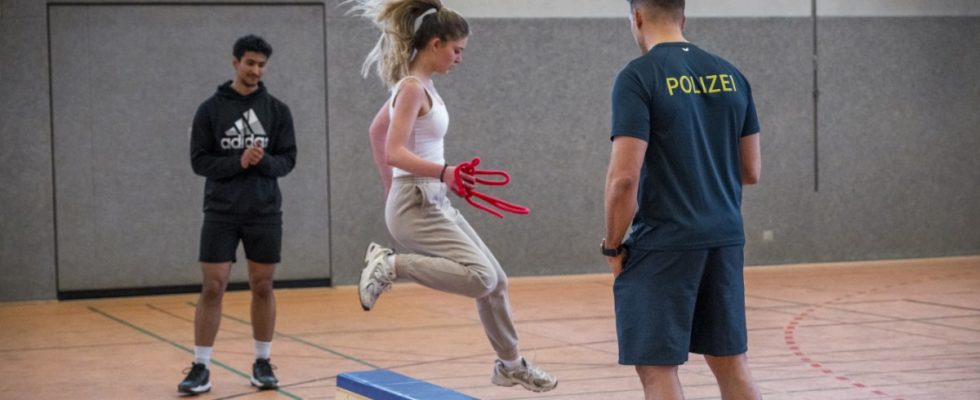Some people start panting audibly as they warm up. At the latest during the exercises, all of the approximately 20 students in the gymnasium of the Bayreuth technical college and vocational college (FOS/BOS) start to sweat: bench presses, pendulum running and bench jumping are on the program in today’s sports lesson. Strength, endurance and coordination are required. The guests are police officers in sports clothes. The twelfth graders – who will be graduating in a few months – are trying out whether they can pass the police’s sports aptitude test.
“You need a basic level of athleticism for our job,” says Tom Nitsche, head of the recruiting team at the Upper Franconia police headquarters. “But we don’t just hire top athletes.”
Finding suitable applicants is not getting any easier for the police. Employers are competing for fewer and fewer young people, whose demands in terms of working conditions and work-life balance are higher than in previous generations. “In addition, due to the switch from G8 to G9, we will have a high school graduate class in 2025 that will almost be canceled,” says Nitsche.
The head of the recruiting team emphasizes that there are currently no acute concerns about recruiting young talent in the Bavarian police: “As of March 1, 2024, we have filled 630 positions across Bavaria. We had over 5,000 applications for these positions.” The Bavarian State Police recruits new people twice a year, namely in March and September. At the start of the training year on September 1st, recruitment numbers are traditionally higher. “We discovered that the thought of having to take a sports test is a hurdle for many,” says Tom Nitsche. But that is unfounded: To pass the test, an average grade of 4.5 is sufficient.
When doing the bench press, students have to lift 60 percent of their own body weight. Tom Nitsche provides support if necessary.
(Photo: Daniel Vogl/dpa)
But the exercises are certainly demanding: When doing the bench press, the young men have to lift 60 percent of their own body weight, the women 45 percent. Anyone who can do this three times has barely passed; from 19 times onwards you get a grade one. Male applicants must jump over a small bench at least 37 times in 30 seconds to pass, while female applicants must jump 29 times. During the shuttle run, participants carry ropes from one side to the other, place them there and jump over two small benches in between. In addition to speed, body coordination is crucial here.
There’s actually a Cooper test, but there isn’t enough time for that in the 90-minute sports lesson at the FOS/BOS Bayreuth. The Cooper test is a twelve-minute endurance run. To pass, men have to cover 2200 meters and women 1900 meters.
Since May 2023, the Upper Franconian police recruiting team has been regularly going to schools to carry out sports tests. “We were the pioneers in Bavaria,” says Nitsche. The police headquarters in Lower Franconia and Upper Bavaria South have now followed suit. In the current school year, his team has already been in 110 classes at more than 30 schools throughout Upper Franconia, including high schools, FOS, BOS, secondary schools and middle schools with an M branch, says Nitsche. The feedback from teachers and students is very positive. In addition to recruiting young talent, it’s about being more close to the citizens and meeting the students at eye level, says Nitsche. This can be seen, for example, in the fact that the police officers use the first-name names of the students when they visit schools.
“Sports tests bring a lot of people to us”
Student Naima Bannert enjoyed the unusual sports lesson. “It was interesting to experience that,” says the 19-year-old. “If you train specifically, the test seems to be feasible. I’ve already thought about whether the police would be something for me. But at the moment I’m leaning towards a technical career.” Classmate Finn Bonnen describes similar impressions: “It was exciting, some things were harder than expected. The bench press went well for me, the shuttle run and the bench jump were strenuous.” The 18-year-old student says he could basically imagine applying to the police. But he will probably study computer science.
“The sports tests at schools bring a lot of people to us,” says Andreas Dinger, a recruitment consultant at the Bayreuth police. This awakens the interest of many young people who previously had not even thought about a career in the police. Young women in particular tend to underestimate themselves, says Dinger: “They often do much better on the sports test than expected.” The young men, on the other hand, often noticed during tests at school where their weak points were and how they could prepare even more specifically for an application process with the police.
Anyone who applies to the police must go through further tests: language test and basic skills test – among other things, logical thinking and memory are tested. The applicant’s communication skills are tested in a group discussion, and a structured interview focuses on social skills, motivation and resilience. A medical examination then follows.
Apart from the sports tests, the police often go to schools, says Andreas Dinger: “We want to break down prejudices, for example that the police service is particularly dangerous.” The sporting achievements of the students at FOS/BOS Bayreuth were, as always, mixed, says Nitsche afterwards: “You could see that they had fun. And there are two students who are interested in further advice and themselves “We want to take a closer look at the career field in the Bavarian police.”

